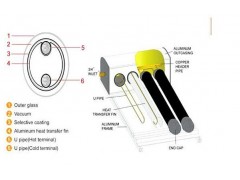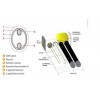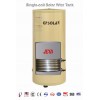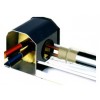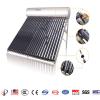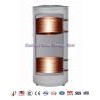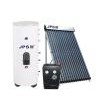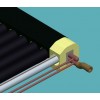Solar water heaters -- also called solar domestic hot water systems -- can be a cost-effective way to generate hot water for your home. They can be used in any climate, and the fuel they use -- sunshine -- is free.
Working principle of U-pipe Solar Collector
The fluid passes through the U-shaped copper pipe which inserted inside the vacuum tube (evacuated tube) and when warmed up, it returns up to the header pipe. An aluminum fin conducts heat from the entire inner surface of the evacuated tube and transfers it to the solar fluid inside the copper pipe. The
fin touch precisely to the inner glass tube and embraces tightly the U copper pipe with solar fluid.
De
1. Use Super thermal U heat pipe
2. Be put in the countyard, roof, balcony
3. Supper conduct heat
Features of U-pipe Solar Collector:
1. No water runs through the vacuum tube, eradicating the decrease of heat efficiency due to water scaling
2. No water runs through the vacuum tube, eliminating the water leakage due to tube breakage or aging of silica gel ring.
3. No water runs through the vacuum tube, thus it will not be cracked in the extremely low temperature.
4. The water heater can still be in normal operation even when a single tube is damaged.
Advantages:
1. No efficiency decrease during service life time
2. No external pipe lines
3. One-side in-/outlet and hence only one roof penetration
4. Best possible insulation
5. Anodized aluminum casing and
6. Angle adjustable
7. Pre-assembled unit and no tube assembling is necessary
8. Ideal for both flat roof and inclined roof
9. Pre-assembled packing
Installing and Maintaining the System
The proper installation of solar water heaters depends on many factors. These factors include solar resource, climate, local building code requirements, and safety issues;therefore, it's best to have a qualified solar thermal systems contractor install your system.
After installation, properly maintaining your system will keep it running smoothly. Passive systems don't require much maintenance. For active systems, discuss the maintenance requirements with your system provider, and consult the system's owner's manual. Plumbing and other conventional water heating components require the same maintenance as conventional systems. Glazing may need to be cleaned in dry climates where rainwater doesn't provide a natural rinse.
Regular maintenance on simple systems can be as infrequent as every 3-5 years, preferably by a solar contractor.

